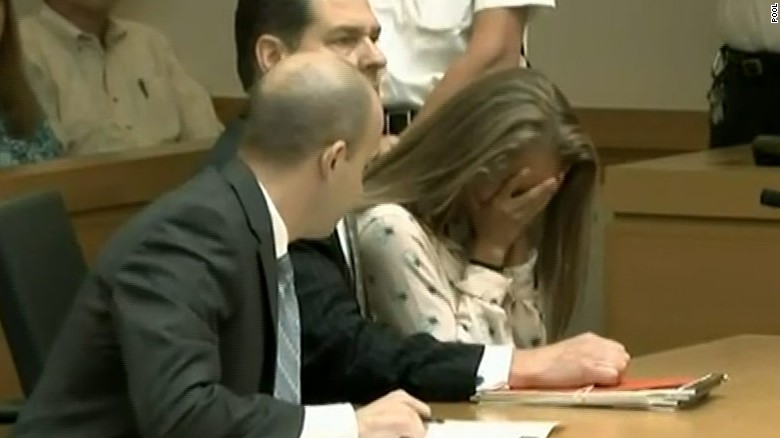
From last summer: This is the picture of Michelle Carter from Massachusetts as she hears a judge tell her "this court has found that (her) actions and failure to act where it was her self-created duty to (her late friend) since she put him in that toxic environment constituted reckless conduct.
This was a case in which existentialism - the belief that every person is responsible for the conduct of his/her own life - met with the court of human decency, which says that we really ought to treat each other better and help out when we can.
You might remember the case; it took place in Massachusetts in 2014 when Michelle Carter, a troubled, well-off young woman with an apparently outsized need for attention and friendship, persuaded a troubled young man to commit suicide as a way of helping him end his sorrow-filled life, thereby garnering for her a lot of sympathy in her feigned grief.
Conrad Roy III, 18 forever, did not receive the love he needed from his parents, and frankly, never ran in the same social circles as Michelle Carter. They did not meet in their home state, but, rather, came to know each other while in Florida visiting respective grandparents. Conrad was morose, a loner, and must have been thrilled to get even bizarre attention from a cute girl from back home.
Back home, in spite of reports that described him as her boyfriend, they were in each other's company a total of five times, but texted and phoned each other thousands of times, and in the texts, the courts found a crescendo of messages from Michelle to Conrad, urging him to end his life.
I won't go into details of how he did it, but when he had assembled the gear he needed, she spurred him on and, when it seemed that he was coming to his senses and changing his mind, she texted things such as:
"I think your parents know you're in a really bad place. Im not saying they want you to do it, but I honestly feel like they can accept it. They know there's nothing they can do, they've tried helping, everyone's tried. But there's a point that comes where there isn't anything anyone can do to save you, not even yourself, and you've hit that point and I think your parents know you've hit that point. You said you're mom saw a suicide thing on your computer and she didn't say anything. I think she knows it's on your mind and she's prepared for it" (sic)
And again, these texts, on the last night of Conrad Roy's life:
Roy: "Okay I'm gonna do it today"
Carter: "Do you promise"
Roy: "I promise babe"
Roy: "I have to now"
Carter: "Like right now?"
Roy: "where do I go? :("
Carter: "And u can't break a promise. And just go in a quiet parking lot or something."
So, here we had a young man at loose ends in life, trying to do something to impress a young girl who, just weeks later, returned to school after summer break and set up a rally to support young women whose boyfriends had committed suicide.
She was willing to let him lose his life in order to put herself in the spotlight of sympathy, and was sentenced last summer to fifteen months in the Masschusetts prison system, but remains free on appeal. Remember, she's well off.
There is movement in the Massachusetts legislature to pass a law making it a crime to engage in "coercing or encouraging suicide," similar to laws already on the books in about 40 other states.
Bristol County Juvenile Court Judge Lawrence Moniz, in explaining the guilty verdict he imposed, looked at those many, many text messages, including the ones at the end, when he was sitting in his truck, probably hoping she'd help change his mind, instead of insulting him and inveighing about his chickening out.
"She admits in ... texts that she did nothing: She did not call the police or Mr. Roy's family" after hearing his last breaths during a phone call, Moniz said as Carter cried silently.
"And, finally, she did not issue a simple additional instruction: Get out of the truck."
Which is why I say, either help a person out or get out of their life. Dragging them down that sad road like this is just heinous.

No comments:
Post a Comment